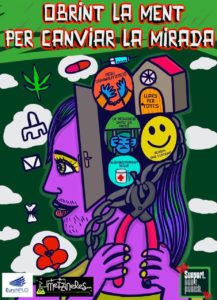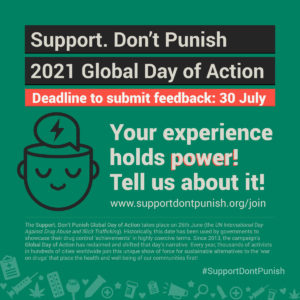The Support. Don’t Punish movement is global and growing. While our needs and priorities may vary from place to place, our message and core goals are most definitely universal:
We want people in our communities to have access to the highest attainable standard of health. To live rich and enjoyable lives. And to have opportunities to develop their own personality and thrive!
If you also share our hopes and can imagine a better future, then you understand why we must end the ‘war on drugs’.
It is hard to overstate the profound and devastating consequences that framing responses to drugs in terms of ‘war’, hostility and coercion have had on us and those around us.
By framing certain drugs as an ‘evil’ to be eradicated, rather than an ancestral reality that we are all responsible for addressing with kindness and the best available knowledge, governments have built an apparatus of punishment and criminalisation that weighs particularly heavy on the shoulders of those already targeted by intersecting forms of oppression.
As the best available evidence shows, the results of this approach have been catastrophic. This is neither a useful nor a sustainable response.
And so, every year, on and around 26 June, thousands of people worldwide mobilise under a shared banner as part of the Support. Don’t Punish Global Day of Action.
Our objective is to advance responses that prioritise our communities’ health, human rights and well-being. And the good news is that there is *plenty* to build upon.
Despite the challenges associated with organising under a catastrophic global pandemic, campaigners rose up to the challenge from over 260 cities of 96 countries, a record reach!
This determination speaks volumes of our commitment to policies, services and practices that place an accent not on criminalisation, but on care, respect and harm reduction.
And our collective purpose has translated beautifully in all corners of the world.
For instance….
In Argentina, Intercambios has continued to expand a coalition of over 100 service providers, advocacy organisations, community-led networks and local government departments to oppose punitive responses and collectively call for change. Together, participating organisations called for the formalisation of the country’s decriminalisation regime (mandated by the Supreme Court over 10 years ago but ignored by the parliament until today). In particular, they took the opportunity to highlight the impact of criminalisation on mental health and access to healthcare.
26 de junio #AcompañeNoCastigue
Porque en la diversidad somos más fuertes.
Porque es un reclamo global 🌐 y nacional 🇦🇷.
Porque la Ley Nº 23.737 criminaliza y vulnera derechos.
Porque #SinDespenalizacionNoHaySaludMental pic.twitter.com/5Y396K1MTl— Intercambios AC (@intercambiosAC) June 26, 2021
In Bogotá, Colombia, the capital’s local department on young people launched a new youth-focused harm reduction programme under the campaign’s banner ! While Acción Técnica y Social, held workshops on personal agency and de-stigmatisation whilst offering basic hygiene and food products to street-based neighbours.
In the state of New York, United States, TruthPharm organised rallies against incarceration and the lack of adequate harm reduction services, training sessions for families impacted by the ‘war on drugs’, and a book discussion led by people with lived experience.
All these folks were trained to become Family Support Coaches for our brand new Family Support Services program! We believe supporting our loved ones, NOT punishing them is the way to go!
Program is partially funded by @UnitedWayBroome & Broome County BOAC.#SupportDontPunish pic.twitter.com/lRz6MqO8HS
— Truth Pharm (@TruthPharm) July 3, 2021
 In Barcelona, Catalonia, as part of a broader campaign by over 12 local partners of the European Network of People who Use Drugs (EuroNPUD), and with support from the Women and Harm Reduction International Network (WHRIN), women-led harm reduction collective Metzineres led a series of activities to advocate for an end to stigma and punitive responses to people who use drugs, including calls to enact a safe supply and housing for all. Mobilisations culminated with a live cabaret (a first in the history of the campaign!) involving activists and artists affiliated with the community.
In Barcelona, Catalonia, as part of a broader campaign by over 12 local partners of the European Network of People who Use Drugs (EuroNPUD), and with support from the Women and Harm Reduction International Network (WHRIN), women-led harm reduction collective Metzineres led a series of activities to advocate for an end to stigma and punitive responses to people who use drugs, including calls to enact a safe supply and housing for all. Mobilisations culminated with a live cabaret (a first in the history of the campaign!) involving activists and artists affiliated with the community.
In Accra, Ghana, the West Africa Drug Policy Network (WADPN) organised a multi-stakeholder forum involving civil society organisations and policy-makers, with the goal of informing about and building upon the foundations of recent government moves towards the decriminalisation of people who use drugs.
In Nairobi, Kenya, the Bar Hostess Empowerment and Support Program (BHESP) gender responsive comprehensive harm reduction services and policy environments that are non-judgemental, non-discriminatory, safe, relevant and supportive for all women who use drugs.
In Delhi, India, the Delhi Drug Users’ Union (DUF) together with the Delhi Network of Positive People (DNP+) organised a well-attended online policy forum that underscored the need for drug policy reform to reduce the destructive imprint of the HIV epidemic on people who use drugs and the Indian people as a whole.
In Indonesia, LBH Masyarakat and Pamflet collaborated on a series of activities encouraging conversations on how young people are specifically and disproportionately affected by drug policies as well as their ideas and solutions toward sustainable change. This was boosted by a though-provoking and visually-stunning social media campaign.
View this post on Instagram
 The experiences above are but a very small sample of the diversity and power of activities organised under the collective banner of the #SupportDontPunish campaign.
The experiences above are but a very small sample of the diversity and power of activities organised under the collective banner of the #SupportDontPunish campaign.
Over the next weeks, we are collating Feedback from far and wide to make sure we provide further platform to your messages and distill important learning to be part of a report of the Day, similar to what we shared for last year’s Global Day of Action.
We would be highly appreciative if you help us spread the word on Twitter, Facebook, Instagram and beyond!
Stay in touch and #SupportDontPunish!